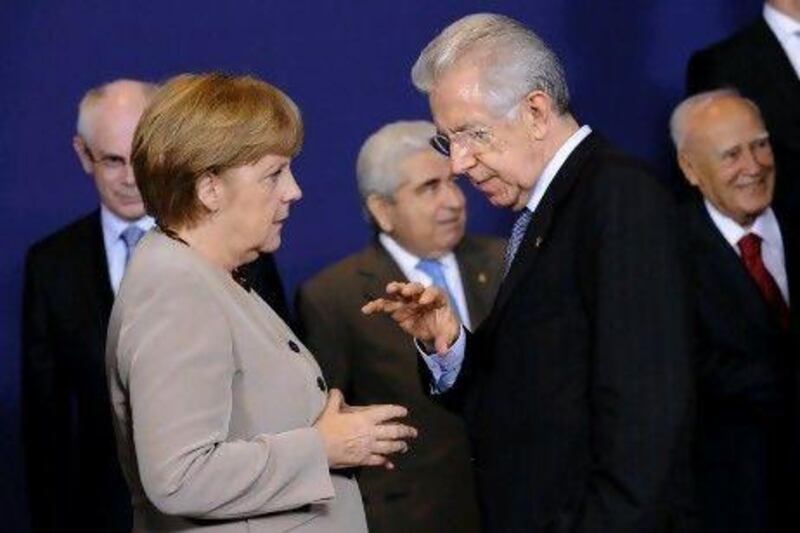European Union leaders focused on immediate help for Spain and Italy at the start of a two-day summit intended to chart a path out of their financial crisis.
The 27 government chiefs will discuss buying Spanish and Italian government bonds to bring down borrowing costs that are near euro-era records, said the Finnish prime minister Jyrki Katainen. He also proposed that bailout funds buy collateralised government debt in primary markets.
"I've come for very rapid solutions to support countries in difficulty on the markets," Francois Hollande, the French president, told reporters as he arrived in Brussels.
Leaders will consider short-term measures to stem the sovereign debt turmoil as the EU President Herman Van Rompuy's road map to strengthen the bloc's common currency and financial oversight ran into immediate opposition from Germany. Angela Merkel, Germany's chancellor, has become increasingly isolated as Mr Hollande, the Italian prime minister Mario Monti and the Spanish premier Mariano Rajoy unite to push for quicker action to ease the crisis that emerged in Greece in late 2009.
Euro-area finance deputies met yesterday afternoon to discuss short-term steps to fight the crisis, according to an EU official.
Italy needs to be able to pool debt sales with the 16 other nations of the euro area to bring down borrowing costs as Mr Monti who has raised taxes and promised spending cuts, exhausts policy options, said Romano Prodi, a former head of government.
"I don't think that anything more can be done, because otherwise you kill the economy," Mr Prodi, Italy's prime minister from 2006 to 2008, said at a press conference in Brussels yesterday. "European solidarity, which must come to euro bonds, is the only possible solution."
Italy yesterday has paid the most to sell 10-year debt since December, selling the notes to yield 6.19 per cent. Spanish 10- year yields rose to 6.94 per cent yesterday. The focus should be on helping Spain's banks and reducing Italian yields to about 4 per cent, the Irish finance minister Michael Noonan said to reporters in Dublin yesterday.
Mrs Merkel, who has rejected calls to investigate joint debt or do more to cut Spanish and Italian borrowing costs, said her focus will be on measures to boost economic growth. As of June 25, draft conclusions for the summit included a pledge to boost the bloc's economy through improved economic governance, better use of the EU's budget and a capital increase for the European Investment Bank.
"The debate ... will centre on a package for growth and employment," Mrs Merkel told reporters before the meeting. "I believe this package is ripe for approval today."
Mrs Merkel met Mr Hollande last night in Paris and will travel to Rome to meet Mr Monti on July 4. Mr Katainen proposed that financially struggling countries issue bonds backed by state assets or tax-revenue streams as a way out of the debt crisis.
European Union Economic and Monetary Affairs Commissioner Olli Rehn said EU leaders need to agree on short-term measures.
"I trust that we will have the possibility to take decisions at the European summit that will help to stabilise financial markets in the short term and help to reduce borrowing costs of countries like Italy and Spain," Rehn told reporters.






